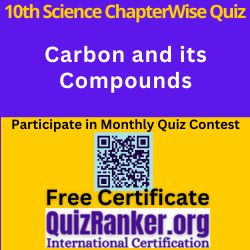10th Science Carbon and its Compounds MCQ Test Chapter 4: Enhance your knowledge with free online multiple-choice questions for CBSE Class 10 Science Chapter 4. Understand the properties, reactions, and uses of carbon and its compounds. Perfect for CBSE exams and competitive test preparation.
Science Carbon and its Compounds MCQ Test
Chapters of 10th Science for MCQ Test
You can not only check your knowledge about for “10th Science Carbon and its Compounds MCQ Test Chapter 4” but also all remaining chapters multiple choice questions.
Chapter 1 Chemical Reactions and Equations MCQ Test
Chapter 2 Acids, Bases and Salts MCQ Test
Chapter 3 Metals and Non-metals MCQ Test
Chapter 4 Carbon and its Compounds MCQ Test
Chapter 5 Life Processes MCQ Test
Chapter 6 Control and Coordination MCQ Test
Chapter 7 How do Organisms Reproduce? MCQ Test
Chapter 8 Heredity MCQ Test
Chapter 9 Light – Reflection and Refraction MCQ Test
Chapter 10 The Human Eye and the Colourful World MCQ Test
Chapter 11 Electricity MCQ Test
Chapter 12 Magnetic Effects of Electric Current MCQ Test
Chapter 13 Our Environment MCQ Test
Also Attempt Free 10th class Math chapter wise MCQ Quiz [For Exam 2025]
Must Attempt Monthly Quiz Contest
- Class 9th Science quiz contest monthly
- Class 9th Math quiz contest monthly
- Class 10th Science quiz contest monthly
- Class 10th Math quiz contest monthly
You can also participate in yearly national quiz contest Dec 2024
Important Link
- NCERT Books PDF
- Our Youtube Channel(Subscribe for view Few Quiz Question Answers)
About Science Carbon and its Compounds MCQ Test
Chapter 4 of the CBSE Class 10 Science curriculum, titled “Carbon and its Compounds,” explores the unique and versatile element, carbon, and its myriad compounds. This chapter is crucial for students aiming to excel in organic chemistry and other competitive exams. The free MCQ quiz provided in this chapter will help students reinforce their knowledge and prepare effectively for their CBSE examinations.
Key Concepts Covered:
- Covalent Bonding in Carbon:
- Carbon forms covalent bonds by sharing electrons with other elements.
- This leads to the formation of various structures such as chains, branched chains, and rings.
- Examples include methane (CH₄), ethane (C₂H₆), and ethylene (C₂H₄).
- Allotropes of Carbon:
- Carbon exists in different forms known as allotropes, including diamond, graphite, and fullerene.
- Diamond is a hard, transparent structure used in cutting tools and jewelry.
- Graphite is a soft, black material used in pencils and as a lubricant.
- Versatile Nature of Carbon:
- Carbon forms a vast number of compounds, more than any other element.
- It forms stable bonds with other elements such as hydrogen, oxygen, nitrogen, sulfur, and halogens.
- The unique ability to form single, double, and triple bonds increases its versatility.
- Hydrocarbons:
- Hydrocarbons are compounds made up of only carbon and hydrogen.
- They are classified into alkanes, alkenes, and alkynes based on the type of bonds between carbon atoms.
- Alkanes (single bonds), alkenes (double bonds), and alkynes (triple bonds) have distinct properties and uses.
- Functional Groups:
- Functional groups are specific groups of atoms within molecules that are responsible for the characteristic chemical reactions of those molecules.
- Common functional groups include hydroxyl (-OH), carboxyl (-COOH), aldehyde (-CHO), and ketone (>C=O).
- These groups impart distinct properties to organic compounds.
- Homologous Series:
- A homologous series is a group of organic compounds with a similar general formula, differing by a CH₂ unit.
- Members of a homologous series have similar chemical properties and gradually changing physical properties.
- Examples include the alkane series (methane, ethane, propane).
- Chemical Reactions of Carbon Compounds:
- Carbon compounds undergo various chemical reactions such as combustion, oxidation, addition, and substitution.
- Combustion of hydrocarbons produces carbon dioxide and water, releasing energy.
- Oxidation reactions involve the addition of oxygen or removal of hydrogen.
- Importance of Carbon Compounds:
- Carbon compounds are essential in everyday life and industrial applications.
- They are used in fuels, plastics, pharmaceuticals, dyes, and many other products.
- Understanding carbon compounds is crucial for advancements in organic chemistry and related fields.
Quiz Structure:
The MCQ quiz for this chapter includes a series of questions designed to test students’ understanding of the properties, reactions, and uses of carbon and its compounds. These questions cover definitions, examples, and applications, ensuring comprehensive coverage of the chapter. The interactive format allows students to practice and assess their knowledge effectively.
Conclusion:
Practicing with the 10th Science Carbon and its Compounds MCQ Test Chapter 4 is an excellent way for CBSE students to prepare for their exams. This chapter provides a thorough understanding of the fundamental concepts related to carbon and its compounds. The MCQ quiz helps reinforce these concepts, ensuring students are well-prepared for their academic assessments and competitive exams.
Total Views: 34
